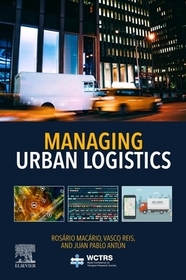
Managing Urban Logistics
Series: World Conference on Transport Research Society;
- Publisher's listprice EUR 109.00
-
45 207 Ft (43 055 Ft + 5% VAT)
The price is estimated because at the time of ordering we do not know what conversion rates will apply to HUF / product currency when the book arrives. In case HUF is weaker, the price increases slightly, in case HUF is stronger, the price goes lower slightly.
- Discount 20% (cc. 9 041 Ft off)
- Discounted price 36 166 Ft (34 444 Ft + 5% VAT)
This book is part of Prospero's 31st birthday offer. If you order a book (marked with the balloon logo) from the birthday list online (in the online shop, by adding it to your shopping cart and placing the order) on 6 October 2025, we will give you a 20% discount on all these books on that day only.
Moreover, if you order at least three of these books (preferably in a single order), we will apply a 30% discount to the lowest-priced book after the order has been received.
If the total value of your order(s) of at least three birthday books reaches 100,000 HUF excluding VAT, we will apply the special 30% discount to the highest-priced book instead of the lowest one — but still only to a single book.
(You will not see the special 30% discount in your shopping cart, as it will be applied manually by our staff after your order has been received. It is important that your order is placed on 6 October; we will not be able to apply the discount before or after this date. The discount is available only for recipients of our ‘Favourite Topics Notification’ newsletter.)
Subcribe now and take benefit of a favourable price.
Subscribe
45 207 Ft

Availability
printed on demand
Why don't you give exact delivery time?
Delivery time is estimated on our previous experiences. We give estimations only, because we order from outside Hungary, and the delivery time mainly depends on how quickly the publisher supplies the book. Faster or slower deliveries both happen, but we do our best to supply as quickly as possible.
Product details:
- Publisher Elsevier Science
- Date of Publication 26 March 2024
- ISBN 9780128144626
- Binding Paperback
- No. of pages286 pages
- Size 228x152 mm
- Weight 470 g
- Language English 548
Categories
Long description:
Managing Urban Logistics provides new insights based on the most recent research, theories, and developments in technological and ICT solutions, contemporary corporate trends, the re-evaluation of the role of authorities, and much more. The book shows how to manage these complex urban logistics issues using a long term, systemic perspective where urban freight distribution is an integral part of the entire urban mobility system. It examines the convergence points between mass and customized deliveries, thus modeling the decision processes, trade-offs and tolerances behind these processes to enable a more fluid sharing of urban space.Users will find an approach that tackles these issues from an empirical viewpoint that is based on analysis from a wide set of cases in urban environments around the world. A fresh and unique multidisciplinary approach that is based on solid theoretical background and a pragmatic management standpoint makes this book a must have for those involved in urban logistics.
MoreTable of Contents:
About the Authors
Foreword
1. Introduction
2. Logistic profiles and Business Models
3. Mass vs customized distribution
4. Modeling urban logistics
5. Vehicles for Sustainable Logistics
6. Reverse Logistics
7. Corporate trends
8. Stakeholders' views
9. Need for light touch regulation
10. Assessment methodologies at different stages of implementation
11. Need for innovation
12. The way forward





